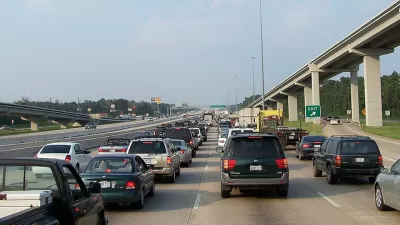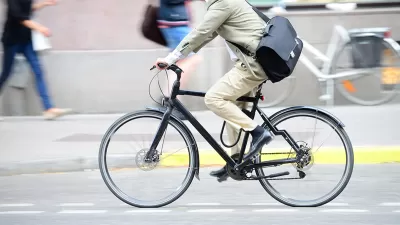Not long ago, I posted on what makes some cities more stressful than others. (See http://www.planetizen.com/node/40441 ). In that post, I remarked that the ideal objective indicia of stress (resident surveys on crime, illness, etc.) often do not exist for most cities.
Not long ago, I posted on what makes some cities more stressful
than others. (See http://www.planetizen.com/node/40441
). In that post, I remarked that the
ideal objective indicia of stress (resident surveys on crime, illness, etc.)
often do not exist for most cities.
It occurred to me that it might be useful to talk about more
subjective indicators- if only to see if other people think about the same
things that I think about. I have lived
in ten cities since graduating from law school 23 years ago (not counting Toronto,
where I have lived for a grand total of two weeks). By far, Miami
was the most stressful of those cities, with Atlanta
a distant second; the two small towns I have lived in (Carbondale,
Illinois and Fort
Smith, Arkansas) the least. The other cities I have lived in (St.
Louis, Buffalo,
Cleveland, Jacksonville,
Washington, and Philadelphia)
have been somewhere in between.
What
made Miami so awful for me?
*The combination of traffic congestion and car
dependence. I find nasty traffic to be
stressful, and I find having to drive in such nasty traffic to be even more
so. To a much greater extent than any
other city I have lived in, Miami combined
rough traffic with public transit that was inadequate to my needs. Atlanta
has even more extensive traffic; however, for most of my time in Atlanta,
I did not have to drive every day. Washington,
by contrast, has traffic even worse than Miami
or Atlanta- but since I did not own
a car I was insulated from this problem.
At the other end of the spectrum, in Carbondale
I could walk from one end of town to the other in two hours- truly a commuter's
ideal.
*Crime, or more precisely the perception of crime. In Miami,
I lived a few blocks from the Brickell subway stop. But rightly or wrongly, I did not feel safe
walking from that subway to my apartment after dark – which in turn meant that when I worked late, I had
to drive through the heavy traffic mentioned above. By contrast, in Carbondale
and Fort Smith I worried very
little about crime. In the "in between"
big cities, crime was obviously higher than in Carbondale or Fort Smith- but I
thought that most of the areas that I walked through on a regular basis were
safer than downtown Miami seemed to be in the early 1990s. Having said that, I emphasize that my stress
came from the perception of crime: I have no idea whether, statistically
speaking, the area around the Brickell subway stop was really more dangerous than
my neighborhoods in other cities.
Of course, my experience teaches me that congestion, crime, and car dependence are important. But also, it teaches me that it is impossible to generalize about a city being stressful for everyone. For example, if I had lived in a distant Washington suburb and had to drive to the city (or even to a Metro stop) I would have experienced Washington as a very stressful place. Conversely, if my Miami job had been closer to my apartment, I might have viewed Miami a bit more positively.

Planetizen Federal Action Tracker
A weekly monitor of how Trump’s orders and actions are impacting planners and planning in America.

Maui's Vacation Rental Debate Turns Ugly
Verbal attacks, misinformation campaigns and fistfights plague a high-stakes debate to convert thousands of vacation rentals into long-term housing.

San Francisco Suspends Traffic Calming Amidst Record Deaths
Citing “a challenging fiscal landscape,” the city will cease the program on the heels of 42 traffic deaths, including 24 pedestrians.

Amtrak Rolls Out New Orleans to Alabama “Mardi Gras” Train
The new service will operate morning and evening departures between Mobile and New Orleans.

The Subversive Car-Free Guide to Trump's Great American Road Trip
Car-free ways to access Chicagoland’s best tourist attractions.

San Antonio and Austin are Fusing Into one Massive Megaregion
The region spanning the two central Texas cities is growing fast, posing challenges for local infrastructure and water supplies.
Urban Design for Planners 1: Software Tools
This six-course series explores essential urban design concepts using open source software and equips planners with the tools they need to participate fully in the urban design process.
Planning for Universal Design
Learn the tools for implementing Universal Design in planning regulations.
Heyer Gruel & Associates PA
JM Goldson LLC
Custer County Colorado
City of Camden Redevelopment Agency
City of Astoria
Transportation Research & Education Center (TREC) at Portland State University
Jefferson Parish Government
Camden Redevelopment Agency
City of Claremont





























